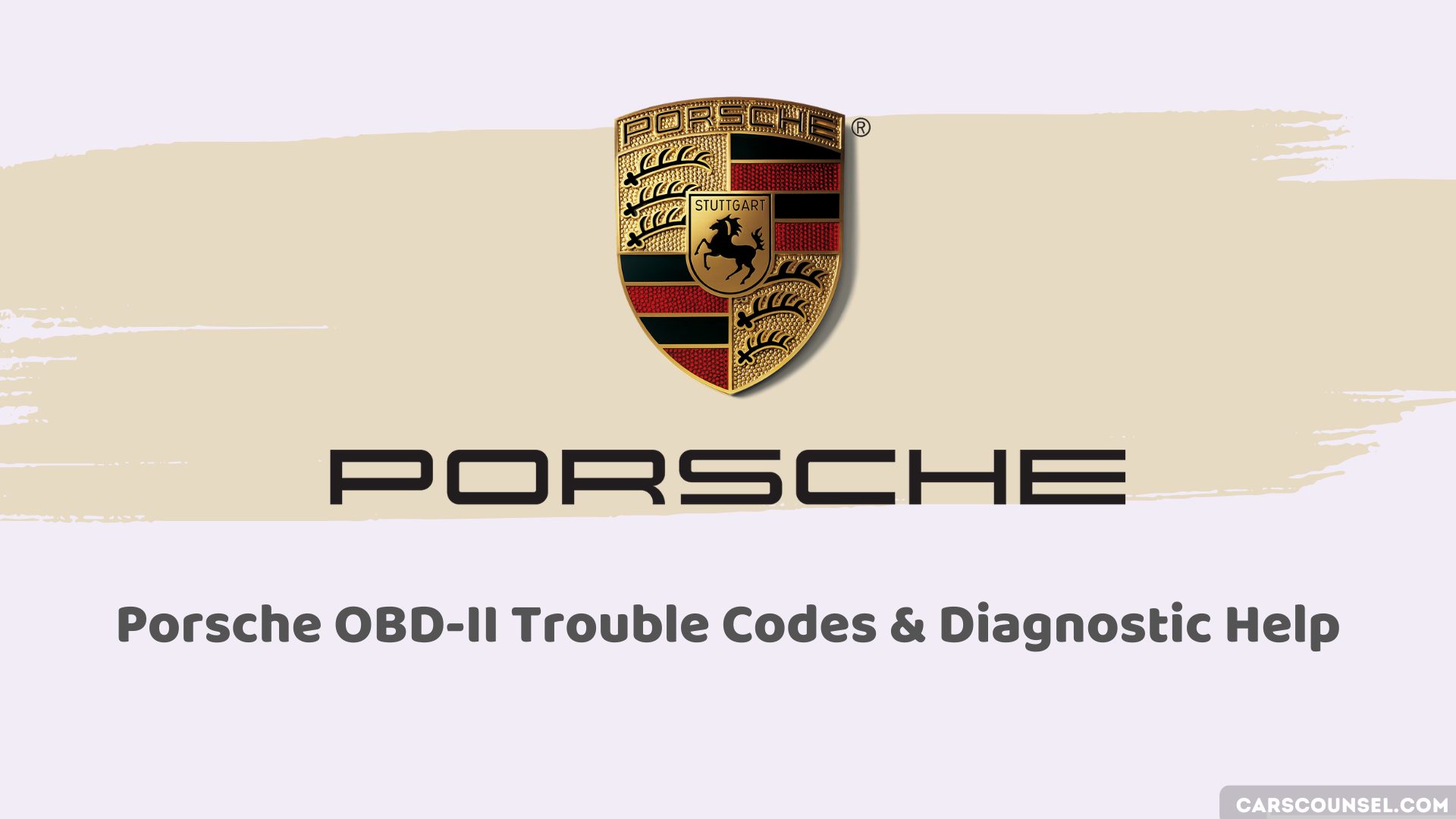When you’re faced with a Porsche’s “check engine” light, you’re just one step away from uncovering a complex puzzle of fault codes. With over 5000 possible codes, it’s easy to feel overwhelmed. But, as you start to dig in, you’ll realize that Porsche’s OBD/OBD2 codes are more than just a series of letters and numbers – they’re a roadmap to diagnosing and repairing your vehicle’s issue.
But, where do you even begin? As you start to navigate this intricate system, you’ll find that understanding these codes is just the tip of the iceberg – and that’s exactly where your journey is about to take a pivotal turn.

Quick Navigation
Understanding Porsche Diagnostic Trouble Codes
When your Porsche’s check engine light illuminates, it’s often a puzzle that requires deciphering, and understanding Porsche diagnostic trouble codes is essential to solving it.
These codes are stored within the engine control module and can be accessed through OBD2 readers, with over 5000 potential codes that can trigger the check engine light.
Fault codes don’t necessarily identify the root cause of the problem, and the same code can have different meanings depending on the car model and control module version.
Codes starting with P1 are Porsche-specific, requiring diagnosis by certified specialists.
Understanding the faulty system requires investigating what could have caused the problem, as a good mechanic will treat fault codes as a reflection of the current system status, not necessarily a faulty component.
Interpreting and Decoding OBD-II Codes
Clarity is key when deciphering OBD-II codes, as a single misinterpreted digit can lead to a misdiagnosis.
As you explore Porsche diagnostic, understanding the structure of OBD-II codes is vital. Each code consists of one letter and four digits, categorizing into four vehicle systems using a prefix letter.
P codes relate to the powertrain system, including the engine, transmission, and drivetrain accessories. Subsets include fuel and air metering, fuel injector circuit issues, and engine misfiring.
Using a code reader, you can retrieve the code and identify if it’s a generic (0) or manufacturer-specific (1) code. By breaking down the code, you’ll gain insight into the troubled vehicle system or circuit, such as vehicle speed controls or computer output circuit problems.
Porsche-Specific Trouble Code Descriptions
Beyond generic OBD-II codes, Porsche vehicles utilize a range of manufacturer-specific trouble codes that require in-depth knowledge for accurate diagnosis and repair.
As you plunge into Porsche-specific trouble codes, you’ll notice that each system has its unique set of codes.
For instance, ABS5 codes relate to anti-lock/traction control systems, indicating issues with the ABS module, wheel speed sensors, or hydraulic pump.
H05 and H06 codes point to problems with the climate control system, such as faulty temperature sensors or compressor issues.
M04 and M06 codes are associated with Motronic systems, suggesting problems with fuel injection, ignition timing, or engine control module faults.
B02 codes pertain to airbag, indicating issues with the airbag module, crash sensors, or wiring harnesses.
Most Common Porsche OBD-II Trouble Codes
| Code | Description |
|---|---|
| P1102 | Oxygen sensor heating |
| P1105 | Oxygen sensor heating |
| P1107 | Oxygen sensor heating |
| P1110 | Oxygen sensor heating |
| P1115 | Oxygen sensor heating |
| P1117 | Oxygen sensor heating |
| P1119 | Oxygen sensor heating |
| P1121 | Oxygen sensor heating |
| P1123 | Oxygen sensing system |
| P1124 | Oxygen sensing system |
| P1125 | Oxygen sensing system |
| P1126 | Oxygen sensing system |
| P1127 | Oxygen sensing system |
| P1128 | Oxygen sensing system |
| P1129 | Oxygen sensing system |
| P1130 | Oxygen sensing system |
| P1140 | Load sensing |
| P1157 | Engine compartment temperature sensor |
| P1158 | Engine compartment temperature sensor |
| P1213 | Fuel injector, cylinder 1 |
| P1214 | Fuel injector, cylinder 2 |
| P1215 | Fuel injector, cylinder 3 |
| P1216 | Fuel injector, cylinder 4 |
| P1217 | Fuel injector, cylinder 5 |
| P1218 | Fuel injector, cylinder 6 |
| P1225 | Fuel injector, cylinder 1 |
| P1226 | Fuel injector, cylinder 2 |
| P1227 | Fuel injector, cylinder 3 |
| P1228 | Fuel injector, cylinder 4 |
| P1229 | Fuel injector, cylinder 5 |
| P1230 | Fuel injector, cylinder 6 |
| P1237 | Fuel injector, cylinder 1 |
| P1238 | Fuel injector, cylinder 2 |
| P1239 | Fuel injector, cylinder 3 |
| P1240 | Fuel injector, cylinder 4 |
| P1241 | Fuel injector, cylinder 3 |
| P1137 | Clutch switch |
| P0600 | CAN timeout Tiptronic |
| P0601 | DME relay/control module faulty (computer monitoring: reset) |
| P0603 | EEPROM Faulty |
| P0604 | Control module faulty (RAM) |
| P0605 | Control module faulty (ROM) |
| P0607 | Control Module Faulty (Computer Monitoring: Reset) |
| P0638 | Throttle Jacking Unit, Position Error |
| P0645 | A/C Compressor Control |
| P0646 | A/C Compressor Control |
| P0650 | MIL Lamp (via CAN) |
| P0674 | A/C Compressor Control |
| P0700 | Tiptronic (CAN transfer box setting implausible) or (Transmission oil temperature above maximum value) |
| P0701 | Tiptronic (Gear implausible/transmission slips) |
| P0702 | Tiptronic (Control unit faulty) |
| P0706 | Tiptronic (Selector lever switch implausible) |

